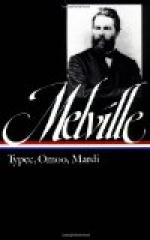“Ah! no gold,” cried Yoomy, “but that comes from dark mines.”
Said Babbalanja, “Bear witness, ye gods! cries fervent old Bardianna, that besides disclosures of good and evil undreamed of now, there will be other, and more astounding revelations hereafter, of what has passed in Mardi unbeheld.”
“A truce to your everlasting pratings of old Bardianna,” said King Media; why not speak your own thoughts, Babbalanja? then would your discourse possess more completeness; whereas, its warp and woof are of all sorts,—Bardianna, Alla-Malolla, Vavona, and all the writers that ever have written. Speak for yourself, mortal!”
“May you not possibly mistake, my lord? for I do not so much quote Bardianna, as Bardianna quoted me, though he flourished before me; and no vanity, but honesty to say so. The catalogue of true thoughts is but small; they are ubiquitous; no man’s property; and unspoken, or bruited, are the same. When we hear them, why seem they so natural, receiving our spontaneous approval? why do we think we have heard them before? Because they but reiterate ourselves; they were in us, before we were born. The truest poets are but mouth-pieces; and some men are duplicates of each other; I see myself in Bardianna.”
“And there, for Oro’s sake, let it rest, Babbalanja; Bardianna in you, and you in Bardianna forever!”
CHAPTER XXIII What Manner Of Men The Tapparians Were
The canoes sailed on. But we leave them awhile. For our visit to Jiji, the last visit we made, suggests some further revelations concerning the dental money of Mardi.
Ere this, it should have been mentioned, that throughout the Archipelago, there was a restriction concerning incisors and molars, as ornaments for the person; none but great chiefs, brave warriors, and men distinguished by rare intellectual endowments, orators, romancers, philosophers, and poets, being permitted to sport them as jewels. Though, as it happened, among the poets there were many who had never a tooth, save those employed at their repasts; which, coming but seldom, their teeth almost corroded in their mouths. Hence, in commerce, poets’ teeth were at a discount.
For these reasons, then, many mortals blent with the promiscuous mob of Mardians, who, by any means, accumulated teeth, were fain to assert their dental claims to distinction, by clumsily carrying their treasures in pelican pouches slung over their shoulders; which pouches were a huge burden to carry about, and defend. Though, in good truth, from any of these porters, it was harder to wrench his pouches, than his limbs. It was also a curious circumstance that at the slightest casual touch, these bags seemed to convey a simultaneous thrill to the owners.
Besides these porters, there were others, who exchanged their teeth for richly stained calabashes, elaborately carved canoes, and more especially, for costly robes, and turbans; in which last, many outshone the noblest-born nobles. Nevertheless, this answered not the end they had in view; some of the crowd only admiring what they wore, and not them; breaking out into laudation of the inimitable handiwork of the artisans of Mardi.




